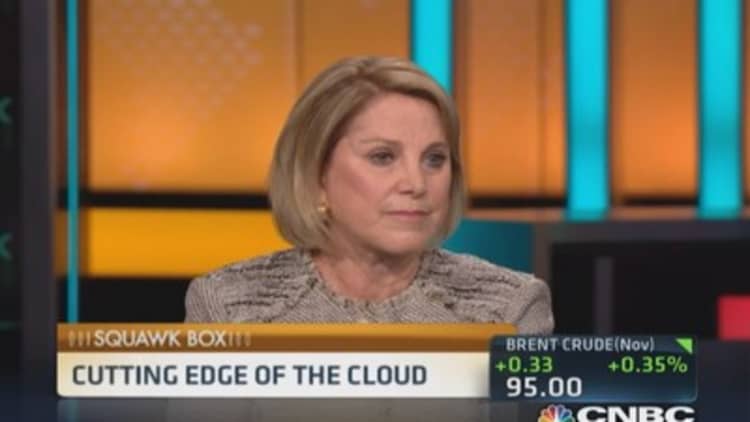Evernote's Phil Libin has bold ambitions: He wants to change the way we work.
Of course, he has a vested interest in making this happen. Libin's cloud-based service, with over 100 million users globally, is a popular digital hub, where consumers and workers can keep all their stuff for a project, a trip or for just staying organized.
Libin's bigger vision, which he'll describe Thursday and Friday at the fourth annual Evernote Conference in San Francisco, is to eliminate files altogether.
According to Libin, our use of documents, spreadsheets and presentations is antiquated and based on technology from the 1980s, when the world was moving from actual paper to computers. To make the switch more palatable, technology tools offered "familiar metaphors" that evoked physical items, Libin says.
Technology has since evolved dramatically. Connected devices are everywhere and high-speed Internet is ubiquitous. But we're still using the same software (a lot of it from Microsoft) that was designed for the days when we printed things out and mailed them in envelopes or fed them through a fax machine.
Read MoreMicrosoft to offer early look at next Windows
Libin says he still uses Microsoft Excel for complicated math and financial modeling. But for the 99 percent of Excel files that have no math in them, like lists and schedules, he insists there are better options.
"We no longer need these archaic concepts of slides and files and docs and folders," Libin said in an interview. "We need to be thinking about a new set of metaphors. We're trying to reinvent the basic concepts of productivity."
Evernote, in its current form, is a Web service and mobile app that lets users write notes that save in the cloud in real time, take pictures and create voice recordings all in one place, accessible on any device. There's a free option or a paid service for $5 a month, which includes the ability to search across all notes and files, save bigger images and scan business cards.

Even in a crowded market with numerous companies big and small trying to create cloud-based productivity suites, Evernote has been able to attract more than $300 million of capital, most recently at a valuation of over $1 billion in 2012, and grow to 380 employees in nine locations around the world.
Without divulging many details about what the new Evernote will look like, Libin describes it as a collaborative workspace, where colleagues come together whether in the same place or on opposite sides of the globe. Emailing files goes away, because ideas sit in a central repository accessible to a group. It's a place to be creative and get work done.
Miles Grimshaw, an associate at venture capital firm Thrive Capital (not an investor in Evernote) and a paying Evernote user, sees the value of the app increasing every day. Grimshaw, who lives in New York, uses it for jotting down notes or recording musings while on the go as well as for saving news articles.
In February, he wrote a blog post discussing the stickiness of Evernote by showing that he'd created 2,104 notes over 1,031 days. It's an all-purpose journal that he started using while studying at Yale University.
Read More
And though it's hard to predict how and when all those bits of data will be useful, the potential is intriguing.
"Over time, a ton of information is in there," Grimshaw said. What's exciting is "how do you sort that and how do you glean insights and get more from it long term," he said.
Those possibilities serve as a reminder of how far Evernote still has to go. The company became one of this generation's Internet darlings by creating a slick interface for an app that spread virally to tens of millions of people before much revenue was coming in the door.
Libin is realistic about where the company is in its journey. There's still plenty of business model tweaking to be done, including raising prices for the first time in seven years, which Libin said will likely happen soon.
While he foresees an initial public offering in the coming years, Libin said he expects to raise more private capital as well as give early employees and investors the opportunity to sell some stock in secondary share sales.
At the moment "we're not ready and don't deserve to be a great public company," he said.



